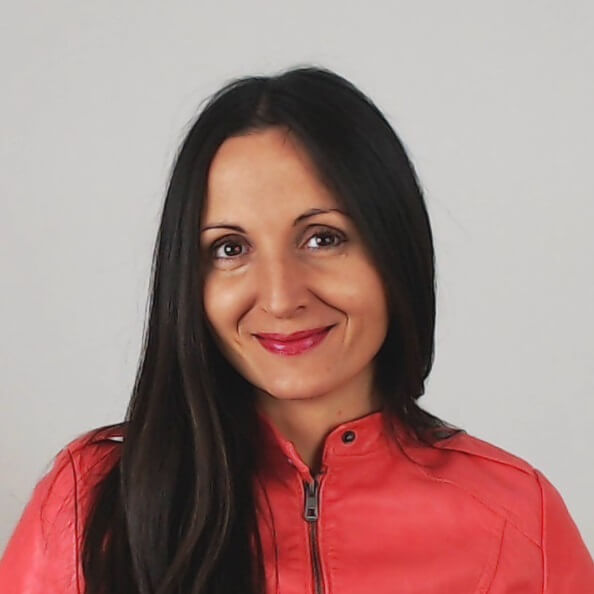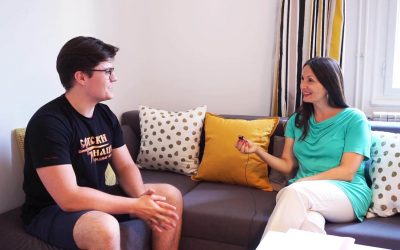Talk Serbian to Your Children!
An Urgent Message to Diaspora
You speak Serbian, your spouse another language. Among yourselves you often communicate in that other language, or even in a third language. And what will your child learn? Should you talk Serbian to your children? Will you confuse them and interrupt their integration in the new society?
If you are a doubtful parent, I’m sure you’ve heard all sorts of advice. We parents have have had enough of the people pretending to know what’s best for our children.
If you have patience, hear my story and my advice. I write it not only as a Serbian language teacher, but also as a mother.
Raising children in another language
There are more mixed couples and marriages every day in the modern world. As a mother, I teach my child only Serbian, because we only speak Serbian in the family. My son has been learning bits of English from his young age. He will learn it in his daycare, and he will eventually learn it, without pressure, because he wishes to communicate with our foreign friends.
As a teacher, I’ve worked with many people who learned Serbian as adults, even though it’s a language of their parents and relatives. I’ve also worked with their children, born in other countries. I dedicate this article to them and to all the Serbian children raised in diaspora.
A Question from a Serbian-born mother raising her son in Texas
The other day I got a question from a mother in Texas. “Serbian is my first language”, she wrote, “English second, that I started learning around 5. At home, we only spoke Serbian at all times. Ever since my dad passed away, my Serbian is getting pretty bad. I forget a lot of things when I talk to my Baba. Now I have a 3 year old son, whom I would like to teach Serbian, and find it impossible. Will I confuse him if I start speaking Serbian and English to him? My Baba says to wait until he speaks English perfectly, but I’m worried if I let too much time pass, I’ll teach him Serbian wrong or he won’t grasp it. What do you recommend I do?”
My Answer
Here’s what I answered to this caring mother:
“Don’t let the time pass, but don’t expect your child to become fluent in Serbian from only talking to you. English will be his native tongue. However, if you regularly expose him to the Serbian language from this early age, it will be far easier for him to speak Serbian and become fluent later in his life.
Me and my team at Serbonika, we work with children of no previous knowledge of Serbian both from families with Serbian background, and from families with no Serbian connections. Even though neither of them have learned the language before, we found that the kids with Serbian background learn much easier. They have been around the language, have been listening to it, and now their pronunciation comes easy and sounds natural.
I have a 5 years old son. I thought him none of the languages I know. It would be unnatural for me to speak in a foreign language to my child every day. But I have exposed him to various languages from the earliest age: I read stories and sang kids songs in English, Italian or Greek to him. We learn how to count in different languages, we read Russian books, and I teach him how to say different words in English. I also regularly speak to other people in foreign languages in his presence. And I believe he’s going to be much better from me in learning foreign languages, because he’s learned to imitate the foreign sounds very well at this early age.
Don’t be afraid to speak Serbian to your son, just make sure to tell him: this is how we say it in Serbian. By now, his English is already dominant and it will always be his 1st language.”
[I recommend reading on a big screen for comparing the two languages in two columns. On mobile, scroll down for Serbian.]
On a sunny day last September I was with my son in a playground. There was also a dad my ear caught talking French to his little girl, about a year and a half old. I always notice these things because I love hearing foreign languages in my town.
As I was lurking for an opportunity to use my rusty French, the dad – to my surprise – addressed me in his obviously native Serbian language.
I plan to teach her how to talk Serbian
After I gave him the information he asked, I couldn’t restrain myself from asking: why in the world don’t you talk Serbian to your child?
“I will”, he said, “I’ll teach her Serbian, I plan to do that.”
He explained further that the girl’s mom is French and that he was proud of her for learning to write Serbian very quickly – even though she hasn’t learned to speak the Serbian language. And French is so difficult to write!
It’s easier for us to learn foreign languages
I dare to say that it is much easier for an average Serb to learn French then it is for an average French person to learn the Serbian language. I can guarantee that.
Even if Serbian is so easy to write and French is so difficult to write.
Because a Serbian child is learning all the case endings and exploring nuances of verbal aspects, as well as the diversity of tones and accents, already at two years of age.
I’m closely watching my son, two years and 4 months old now, experimenting with all these features of the Serbian language and growing his grammar brain.
I like to call him “my little linguistic miracle”.
They never learned the Serbian language from their parents
Then I remembered many people with a Serbian name and surname that came looking for my lessons, unable to utter a simplest sentence in the Serbian language.
I also remembered my students who wanted to learn the language of their parent(s) and had to start from scratch because their parents didn’t teach them the language. Like Laila whose mother was afraid that her Serbian would interfere with her Arabic.
And I remembered other students who had the opportunity to speak Serbian language at least with their grandparents: they learned it so much quicker, and their pronunciation was so much better.
So I said: talk Serbian to your child!
I said to that dad, talk Serbian to your child! Make her bilingual, she will be grateful one day.
Here’s what you do: each parent simply speaks in their own language to the child, consistently. You speak Serbian, your wife speaks French. And you’ll create a powerful bilingual brain in your child. She might take a little longer to start talking, but when she does, she’ll speak both languages.
Finally, I said what my profession was and I told him about my experience. He looked me puzzled in the eye and thanked me.
That is when I decided to tell this story and to make this video. I speak Serbian language, but there are English subtitles so you can share with your friends and partners.
My message is short and clear:
Talk Serbian with your children!
Jednog sunčanog dana prošlog septembra bila sam sa svojim sinom na igralištu. Tamo je bio i jedan tata kog sam načula kako govori francuski sa svojom devojčicom, starom oko godinu i po. Uvek primetim takve stvari zato što baš volim da čujem strane jezike u mom gradu.
Vrebala sam priliku da upotrebim svoj zarđali francuski, kad mi se – na moje iznenađenje – tata obratio na očigledno maternjem srpskom jeziku.
Planiram da je naučim da priča srpski
Dala sam mu informaciju koju je tražio i nisam se mogla suzdržati a da ne pitam: zašto, zaboga, ne govorite na srpskom jeziku sa svojim detetom?
„Hoću“, rekao mi je, „naučiću je srpski, planiram da je naučim.“
Još je objasnio da je devojčicina mama Francuskinja i da je jako ponosan na nju što je brzo naučila da piše srpski – iako još uvek nije naučila da govori jezik. A francuski je tako težak za pisanje!
Nama je lakše da učimo strane jezike
Usuđujem se da kažem da je mnogo lakše jednom prosečnom Srbinu da nauči francuski nego što je jednom prosečnom Francuzu da nauči srpski jezik. Mogu to da garantujem.
Iako je srpski tako lak za pisanje a francuski tako težak.
Zato što srpsko dete uči sve završetke za padeže i istražuje nijanse glagolskog vida, kao i raznolikost akcenata i narečja, već sa dve godine.
Pažljivo posmatram svog sina, kome su sada dve godine i četiri meseca, kako eksperimentiše sa svim tim elementima srpskog jezika i razvija svoj gramatički mozak.
Volim da ga zovem „moje malo lingvističko čudo“.
Oni nikada nisu naučili srpski jezik od svojih roditelja
Tada sam se setila mnogih ljudi sa srpskim imenom i prezimenom koji su zatražili moje časove, nesposobni da slože i najprostiju rečenicu na srpskom jeziku.
Setila sam se i mojih učenika koji su želeli da nauče jezik svojih roditelja, a morali su da počnu od nule jer ih roditelji nisu naučili tom jeziku. Kao što je Lejla, čija se majka plašila da bi joj srpski smetao da nauči arapski.
I setila sam se drugih učenika koji su imali mogućnost da govore srpski jezik makar sa dedom i babom: oni su mnogo brže učili i njihov izgovor je bio mnogo bolji.
Zato sam rekla: pričajte srpski sa svojim detetom!
Rekla sam tom tati: pričajte srpski sa svojim detetom! Neka bude bilingvalna, biće vam zahvalna jednog dana.
Evo šta treba da radite: svaki roditelj jednostavno govori na svom jeziku sa svojim detetom, dosledno. Vi pričate srpski, vaša žena francuski. Tako ćete stvoriti moćan bilingvalni um u vašem detetu. Možda će joj trebati malo više da progovori, ali kada počne da priča, govoriće oba jezika.
Na kraju sam rekla čime se bavim i ispričala mu svoje iskustvo. On me je zbunjeno pogledao pravo u oči i zahvalio mi se.
Tada sam odlučila da ispričam ovu priču i da snimim ovaj video. Govorim srpski jezik, ali tu su titlovi na engleskom tako da možete podeliti sa svojim prijateljima i partnerima.
Moja poruka je kratka i jasna:
Pričajte srpski jezik sa svojom decom!
by Magdalena Petrovic Jelic
Founder of Serbonika
Serbian language teacher and entrepreneur, language lover and polyglot, but also a mother and a relentless storyteller. Read more about me.
My mission is to create the best method for learning Serbian. Would you like to learn Serbian with my lessons? Try free.
/English translation of the video/
Many friends of mine, acquaintances, friends from university, went abroad. They live in Germany, Austria… I even have a friend in Malta.
And many of you ask me: „What with kids, which language to teach them?“
What language will children learn in diaspora and mixed marriages?
Many of you are in mixed marriages and things get complicated there. You speak Serbian, your spouse another language, among yourselves you often communicate in that other language, or in English, a third language, and what will your child learn?
Many parents are afraid that the child will be deprived if they don’t teach her the language of the country they live in. That’s why they’re trying to speak with the child in that language, because they want the child to assimilate.
Then, as the child grows older, the parents feel sorry because he doesn’t speak their native language. And then they contact me, or other teachers, and want that their child to learn the language from the teacher.
And that’s much harder.
Speak in the Serbian language with your child from their birth
Speak in the Serbian language with your child. That’s the biggest gift you can give him. Serbian is a very complex language. Our cases are something that no foreigner will ever learn as native language.
And for many of you who live abroad, many of your children (I’ve worked with such people) learn it as a foreign language. They have some knowledge, but it is very difficult that they will learn it as their mother tongue.
That’s why the biggest gift you can give to your child is to transfer to them the love of your language and to transfer the knowledge of your own language only by talking to them in that language, from their birth.
Tell your child what you’ve been doing during the day, recount. Tell him about what he knows. That’s how he can connect the language with reality. Tell him about what’s going on around you, tell them about what he can see, what he experienced. Because that’s how he can connect the language with reality, what the language signifies in reality.
Knowledge of Serbian will help your child learn other languages
The Serbs are famous for their capacity to learn foreign languages well. I’ve been to Greece and Italy at universities and there I heard that we rank very well. In England also, we rank very well for our capacity to learn foreign languages.
That much, to that extent, your child will never learn Serbian if he’s learning it as a foreign language. Only if he’s adopting it from you, if he learns it from your mouth, will he learn it the best.
Don’t worry, your child will certainly fit in
And don’t you worry, children will most certainly learn the language of the country they live in. Your child will socialize with other children, he will go to kindergarten, he’ll go to school, where he’ll learn that language.
And he’ll certainly learn it.
Don’t you worry that your child won’t speak the language of the community if you speak Serbian with him at home.
/Transcript of the video/
Mnogi moji prijatelji, poznanici, drugari sa studija su otišli u inostranstvo. Žive u Nemačkoj, u Austriji… imam čak i prijateljicu na Malti.
I mnogi od vas me pitaju: „Šta sa decom, koji jezik podučavati?“
Koji jezik će deca naučiti u dijaspori i u mešovitim brakovima?
Mnogi od vas su u mešovitim brakovima i tu se stvar komplikuje. Vi govorite srpski, vaš suprug ili supruga govori neki drugi jezik, međusobno se sporazumevate često na tom drugom jeziku, ili pak na engleskom jeziku, na trećem, i šta će dete naučiti?
Mnogi roditelji se boje da će dete ostati uskraćeno ako ga ne nauče jezik te zemlje u kojoj žive. I zato se trude da sa detetom pričaju na tom jeziku, jer žele da se dete asimiluje.
Onda kad dete malo poodraste, onda roditeljima bude žao što ono ne zna njihov maternji jezik. Pa onda kontaktiraju mene, ili druge profesore, i žele da njihovo dete nauči jezik od profesora.
To onda bude mnogo teže.
Pričajte na srpskom jeziku sa svojim detetom od rođenja
Pričajte na srpskom jeziku sa svojim detetom. To je najveći poklon koji mu možete dati. Srpski jezik je jako kompleksan. Naši padeži su nešto što nijedan stranac nikada neće naučiti kao maternji jezik.
A puno vas koji živite u inostranstvu, puno vaše dece (ja sam sa takvim ljudima radila) uče ga kao strani jezik. Imaju nešto znanja, ali je jako teško da ga nauče kao maternji jezik.
Zato najveći dar koji možete da poklonite svom detetu jeste da mu prenesete ljubav prema svom jeziku i da mu prenesete znanje svog jezika samo na taj način što ćete govoriti sa njim na tom jeziku, od rođenja.
Pričajte svom detetu šta ste radili tokom dana, prepričavajte. Pričajte mu o onome što ono zna. Tako može da povezuje jezik sa realnošću. Pričajte mu o onome što se dešava oko vas, pričajte mu o onome što ono može da vidi, što je doživelo. Jer tako može da povezuje jezik sa realnošću, šta jezik označava u stvarnosti.
Znanje srpskog će vašem detetu pomoći da nauči druge jezike
Srbi su poznati po tome što dobro uče strane jezike. Ja sam bila u Grčkoj i u Italiji na univerzitetima i tamo sam čula dosta se dobro kotiramo. I u Engleskoj takođe, dosta se dobro kotiramo koliko smo sposobni da naučimo strane jezike.
Toliko, u toj meri, vaše dete nikad neće savladati srpski jezik ako ga uči kao strani. Jedino ako ga usvaja od vas, ako ga uči iz vaših usta, tako će ga najbolje naučiti.
Ne brinite, vaše dete će se sigurno uklopiti
A nemojte se brinuti, deca svakako, svakako nauče jezik zemlje u kojoj žive. Vaše dete će se družiti sa drugom decom, ići će u vrtić, ići će u školu, gde će učiti taj jezik.
I svakako će naučiti taj jezik.
Nemojte se brinuti da vaše dete neće govoriti jezikom sredine ako vi kod kuće sa njim govorite srpski.
Serbonika
Najbolja metoda za učenje srpskog jezika
The best method to learn Serbian
The sooner you start learning, the sooner you’ll start talking. Take action now!
6 ways to learn Serbian
Find the perfect solution to learn Serbian individually or in group, with or without a teacher. Choose the best option for your personality and your budget.
Learn Serbian Free – 100% Free Serbian Resources
Free Serbian resources for everyone interested in the Serbian language, Serbian culture and lifestyle. Learn Serbian free, on your own, from the comfort of your mobile phone.
All about Teaching and Learning Serbian: an Interview
The core principles of my teaching and my method, and all about teaching and learning Serbian as a foreigner, revealed in this interview with Michael of the English Podcast in Serbia.



